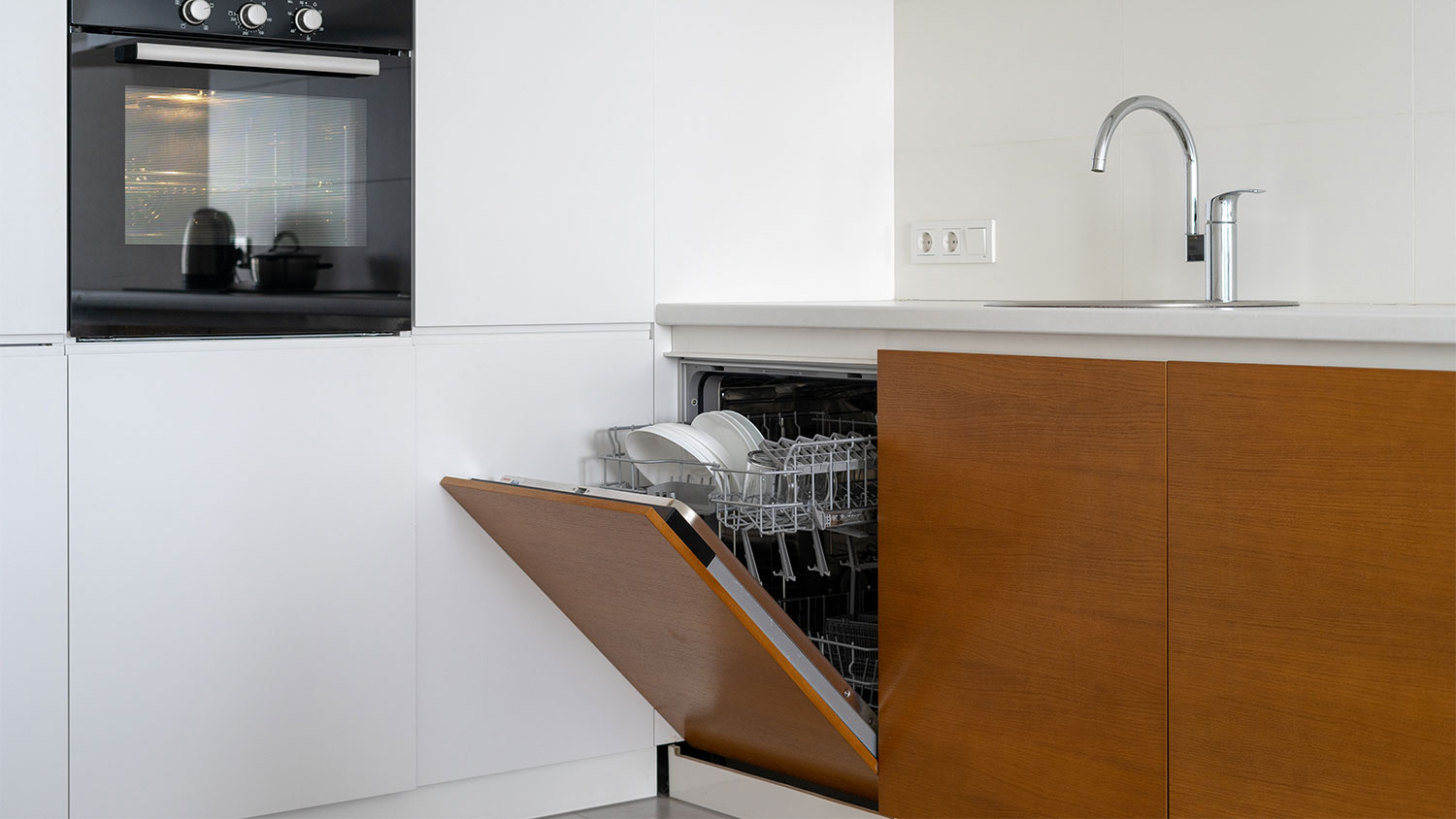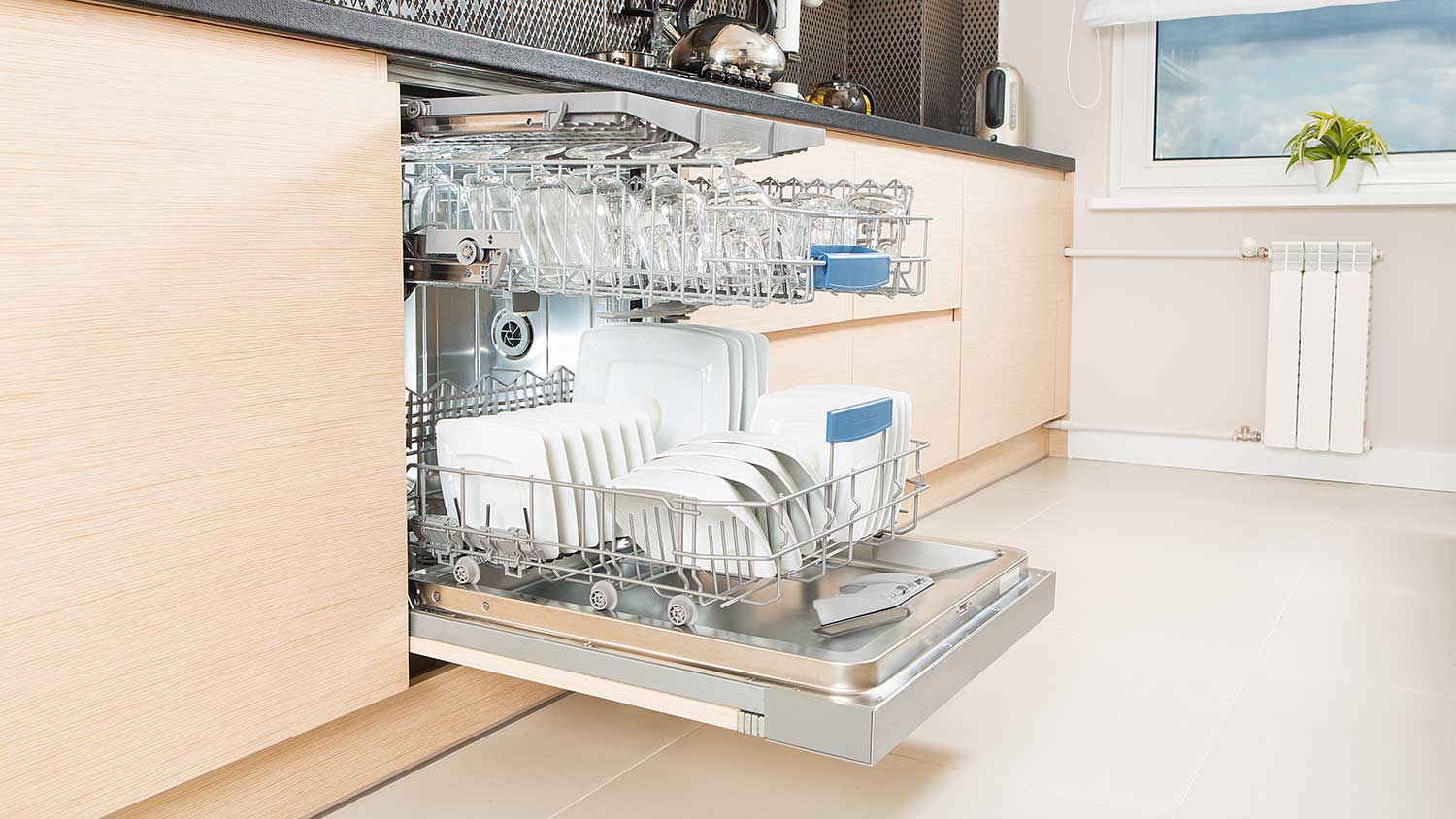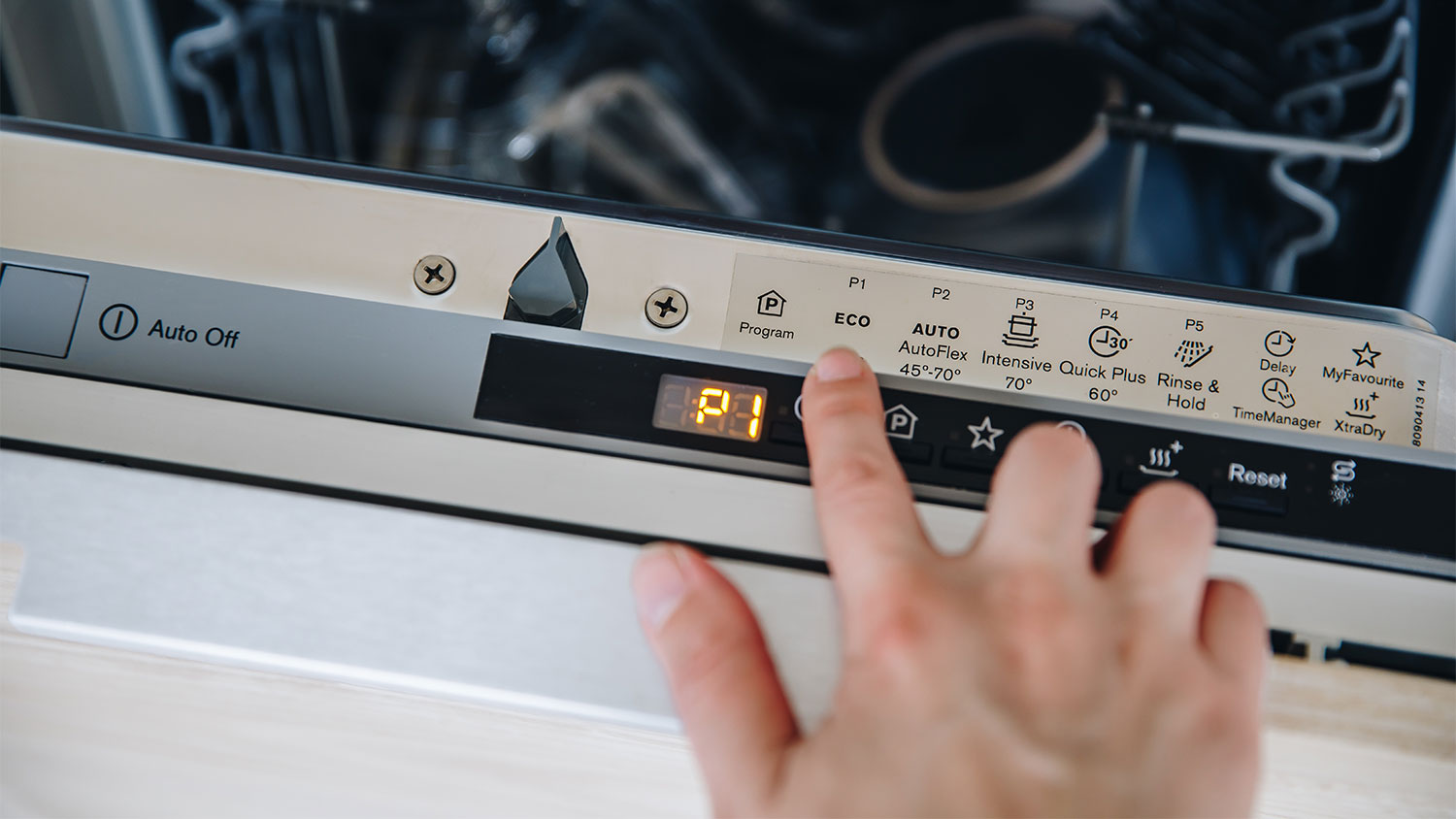Ultimate Dishwasher Buying Guide
Find the right dishwasher for your kitchen, whether it’s something simple that gets the job done or an appliance with all the bells and whistles


Scrubbing dishes is time-consuming, and let’s be honest, it’s a dirty job. Whether you’re completely renovating your kitchen or you just want to make cleaning up after dinner a little easier, you might consider purchasing a new dishwasher. These days, there are many things a dishwasher can do, from cleaning your heirloom china to sanitizing glasses after having guests over. Before you head to a home improvement store, check out this dishwasher buying guide to help find the best appliance for your needs.
What to Look For In a Dishwasher
Finding a great dishwasher is more than just choosing one that will clean your dishes. The whole point of a dishwasher is to make life more convenient, so you’ll want to find one that can last for several years and is easy to repair. Plus, it’s important to find a dishwasher that will fit seamlessly into your kitchen.
Types of Dishwashers

You may be searching for a built-in dishwasher to fit under your counters, but there are other configurations to consider. For example, if you’re looking for a dishwasher for your vacation home, or maybe you’re building out a tiny home or accessory dwelling unit (ADU), a portable or countertop dishwasher might work for small, tricky spaces.
Here are the main categories of dishwashers:
Built-in: When you think of dishwashers, a built-in is what probably comes to mind. This type of dishwasher slots between your cabinetry and under your counter, so it doesn’t take up precious floor space.
Drawer: Akin to a secret door hidden by a bookcase, the drawer dishwasher looks like a regular drawer in your kitchen. Drawer styles offer a luxe look, but they may limit the amount of space inside the dishwasher.
Portable: If you don’t want to rip out cabinet storage space, a portable dishwasher may be the right solution. This type is smaller than built-in dishwashers and sits on casters, so you can move it up against the sink when it needs to run. Then, push it away to store it.
Countertop: This dishwasher is small and sits right on top of a counter, making it ideal for small accommodations like an apartment or ADU.
Design

If you’ve spent a lot of time and money renovating the kitchen of your dreams, the last thing you want is a big, bulky dishwasher that clashes with those polished marble counters and crisp, white cabinetry. Consider these design elements for dishwashers in different price ranges:
Budget: A budget dishwasher starts at around $250. For a high-end look, opt for one with a stainless steel front panel.
Mid-range: Mid-range dishwashers, which cost $400 to $700, are also available in stainless steel, or you can choose one that has a panel-ready front. This means you can attach a panel that matches your cabinetry for a custom look.
Luxury: High-end dishwashers may cost $700 to over $2,000 and include plenty of features to make cleaning more convenient. As far as design goes, these options often include stainless steel front panels and interior tubs, or you can customize them to match your kitchen.
Performance and Reliability
All appliances can break down from general wear and tear, but your new dishwasher selection needs to last longer between repairs. Of course, you can also check reviews to make sure you won’t constantly be rewashing dishes. When it comes to performance and reliability, your dishwasher should be easy to use, clean dishes efficiently, and break down infrequently.
Serviceability
Consider the following scenario: Your dishwasher starts making a weird noise, so you call an appliance repair specialist to take a look. But they deliver some bad news—they can’t get parts for your dishwasher. Obscure brands or high-tech dishwashers may be on the cutting-edge, but finding parts for them if something breaks can be tricky. Alternatively, you might score a great deal on a secondhand dishwasher, but the manufacturer no longer makes replacement parts.
The takeaway here is that you’ll want to find a dishwasher that meets your needs, but make sure it’s not so vintage or advanced that you can’t get it easily fixed.
Popular Dishwasher Brands
There are dozens of dishwasher brands on the market, but some have been around for longer. Customers have trusted these reputable brands for years based on their reliability, design, and convenient features:
Whirlpool
Maytag
Samsung
GE
Viking
Frigidaire
Kenmore
LG
Kitchenaid
Bosch
How Much Does a Dishwasher Cost?
A new dishwasher costs $400 to $700 on average, although you can find budget options around $250 or luxury dishwashers priced for $2,000 or more. Typically, the more expensive the dishwasher, the more features you get. Plus, higher-end dishwashers are often quieter and are made to blend into your kitchen’s design.
If you’re not sure how to hook up the dishwasher, you can hire an appliance specialist to do it for you. Installing a new dishwasher costs around $110 to $270.
10 Best Dishwasher Features
Any dishwasher will clean your dishes, but additional features are what make this appliance work more conveniently for you. You may prefer a dishwasher that operates quietly so it doesn’t disturb family movie nights, or maybe you want a timer feature that you can set to run the dishwasher while you’re at work. Look for some of these popular dishwasher features in your next appliance.
1. Adjustable Racks
If you’ve ever tried to jam a cookie sheet into the dishwasher, you know how frustrating it can be when you just need one little inch of extra space. Some dishwashers have adjustable racks, so you can squeeze even your biggest pots, pans, or baking sheets into the dishwasher rather than scrubbing them by hand.
2. Scheduler or Timer
A timer feature is especially handy for louder dishwashers. You can also save money on utilities when you run appliances at night. With a timer, you can set the dishwasher to run a set number of hours later.
3. Energy Efficiency
Aside from running your appliances at night when utility rates are lower, you can also save money with Energy Star-rated dishwashers. This label means the appliance meets standards for energy savings, and you’ll often find that energy-efficient dishwashers save water, too. These appliances are a higher up-front investment than conventional dishwashers, but they’ll save you money on utility bills each month. An Energy Star dishwasher costs about $35 a year to run and can save over 3,000 gallons of water in its lifetime.
4. Soil Sensor
Mid-range dishwashers often include soil sensors, which help save water by automatically choosing the proper cycle based on the detected soil level of each load.
5. Rinse-Hold
You’ve loaded a few messy breakfast dishes in the dishwasher, but now you need to leave for work. It’ll be hours before you can fill it enough to run a full load. By then, those scrambled egg bits will be basically glued to the pan. A rinse-hold feature will quickly rinse, but not fully wash, the dishes to prevent stuck-on messes until you have a full load to run.
6. Self-Cleaning vs. Manual Filter
Self-cleaning filters are convenient, but they require a grinder to remove the food debris. That means dishwashers with this type of filter are usually louder. Manual filters require you to remove and clean the filter. Otherwise, your dishwasher will start smelling. This is an extra cleaning task for you, but it does mean your dishwasher will run quieter.
7. Capacity

Most dishwashers are about 24 inches wide and have enough space for 12 to 16 place settings, perfect for hosts who love to have guests over for dinner parties. If you require less volume, you may save money by opting for a dishwasher with a smaller capacity.
8. Speed
You’ve started the dishwasher, only to remember you need the microplane to zest lemons for a dinner recipe. With most dishwashers, you’ll wait about two hours before the dishes are clean and dry. Some dishwashers may offer speed cycles that take only 30 minutes, while others have a longer run time of three hours. Note that dishwashers with shorter cycles run harder, which costs more money for energy and water.
9. Noise Level
Dishwashers are notoriously noisy, but if you’re willing to splurge on a mid-range or luxury dishwasher, you may get more peace and quiet for the price tag. If you’re buying a budget model, look for options with a manual filter, which are quieter than those with self-cleaning filters.
10. Cycles

You might always run your dishwasher on the normal cycle, in which case any type of dishwasher will do. If you want special cycles, like express cleaning, sanitizing, steam cleaning, or cleaning delicate items like china or crystal, you’ll need to opt for a mid-range or luxury dishwasher. Basic models usually include two to three wash cycles, while mid-range and luxury dishwashers have at least five different cycle options.


- Appliance Repair Companies
- Washing Machine Repair
- Dryer Repair
- Refrigerator Repair
- Dishwasher Repair
- Oven Repair
- Wood & Pellet Stove Repair
- Freezer Repair Services
- Wood Stove Services
- Gas Stove Repair
- Emergency Appliance Repair Companies
- Ice Maker Repair
- Gas Appliance Repair
- GE Appliance Repair
- GE Refrigerator Repair
- GE Dryer Repair
- GE Dishwasher Repair
- GE Washing Machine Repair
- Samsung Appliance Repair
- Samsung Refrigerator Repair
- Samsung Dryer Repair
- Samsung Washer Repair
- Samsung Dishwasher Repair
- Samsung Oven Repair
- Whirlpool Repair
- Whirlpool Refrigerator Repair
- Whirlpool Washer Repair
- Whirlpool Dryer Repair
- Whirlpool Oven Repair
- Maytag Appliance Repair
- Maytag Refrigerator Repair
- Maytag Washer Repair
- Maytag Dryer Repair
- Maytag Dishwasher Repair
- Kitchenaid Appliance Repair
- Kitchenaid Oven Repair
- Kitchenaid Refrigerator Repair
- Kenmore Appliance Repair
- Kenmore Dishwasher Repair
- Kenmore Washer Repair
- Kenmore Dryer Repair
- LG Refrigerator Repair
- Bosch Appliance Repair
- Kenmore Refrigerator Repair
- LG Appliance Repair Services
- GE Microwave Repair
- Electrolux Appliance Repair
- Electrolux Washer Repair
- Kitchenaid Dishwasher Repair Services
- Wood Stove Inspection
- Dishwasher Installation
- Trash Compactor Repair
- How Long Do Dishwashers Last?
- Dishwasher vs. Handwashing: Cost, Water, Energy, and More
- Reasons Your Dishwasher Is Leaking from the Bottom and What to Do
- How to Clean a Dishwasher Thoroughly and Keep It Running
- Do Dishwashers Use Hot Water?
- 5 Types of Dishwashers and How to Choose One For Your Home
- Dishwasher Not Cleaning? Reasons Why and What to Do
- 5 Must-Follow Tips for a Healthy, Happy Dishwasher
- Do Dishwashers Save Water? Why You Should Wash Your Hands of Handwashing
- How to Clean a Moldy Dishwasher










